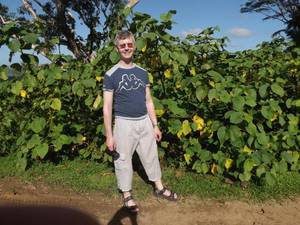Related News

German Kava Scientist and advocate Dr. Mathias Schmidt visited the Institute of Applied Sciences (IAS) laboratory on Wednesday 6th May, 2015. His visit was part of the European support through the PHAMA (Pacific Horticulture and Agricultural Market Access) program in support for Kava related activities in the South Pacific region. More specifically, he is working with governments of kava exporting countries in the need to formulate kava standards in preparation of possible kava export to the European Union.
For a number of years, kava exports to the European Union for the manufacture of kava based drugs have been banned. This follows allegations that kava was responsible for fatal liver toxicity. This was later refuted by experts. After years of fighting against the ban (Dr. Schmidt being one of those in the forefront), it was finally lifted 2 month ago.
In preparation for kava re-entering the European market, the Secretariat of the Pacific Community (SPC-PHAMA) had been surveying the different kava varieties throughout Fiji and hundreds of samples sent to the IAS laboratory for kava lactones determination. Data obtained would enable PHAMA to advise farmers on the best variety that the market may demand.
The IAS laboratory together with PHAMA will carry out more kava lactones analyses. The lab is also well placed to continue to conduct kava analysis for exporters as it used to do a number of years ago.